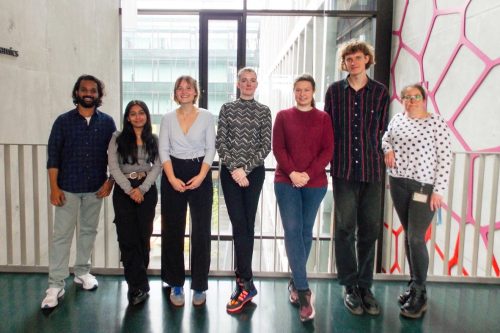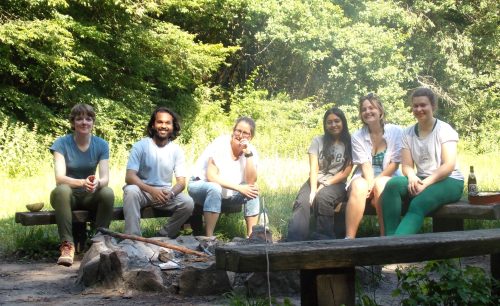New PI diaries: Hiring people and building a lab
Posted by Margot Smit, on 23 August 2024
On my first day at the ZMBP last October I saw our lab space and my first thought was ‘I have a lab!’. A little over half a year later, this May, our lab consisted of me, Steffi, Yadhu (PhD), VJ (PhD), Friederike (BSc), and Sarah (BSc). One afternoon in May we were all working in the lab: cloning, dissecting embryos, optimizing staining protocols. And then that thought repeated itself ‘I have a lab!’. And it wasn’t untrue in October it wasn’t true, but it was true differently in May. It felt different in May, bigger somehow but mostly just more meaningful. We are now doing experiments, developing projects, training new lab members, teaching students, writing a review, finishing BSc theses having lab lunches, and so much more. The lab is labbing and I’m loving it.

But how does a lab grow? Recruiting is an essential, but challenging part of building a lab, especially when starting out. I think lab culture is tremendously important; science itself provides you with enough challenges and you need those around you to support you in handling those setbacks and opportunities. I want to grow a group where we all love doing great science and asking critical, helpful questions, but also where we like being around each other and communicate well. So, what am I thinking about when recruiting new lab members? As I am now recruiting a Postdoc and we have new BSc students starting this fall I thought recruiting was the perfect theme to cover in this blog. With some advice for those recruiting and for those wanting to be recruited. Take this with a grain of salt, I am no expert and I am very new to this. But I do care and I am continuously working to improve.
For those starting to recruit
My main advice is to get advice. I talked with others in the department about their strategies, I next asked them for opinions on specific candidates, and I read books on lab management to think more about strategy and come up with questions. My goal is to be fair, consistent, and objective as much as possible but to not ignore my intuition.
With BSc students joining the lab I’ve been super lucky. I think those are difficult to judge as they are often very much still figuring out their interests and motivations. So far, my approach has been: if they seem motivated and communicate well it’ll probably be ok. And then when the lab is full, we are full. It’s worked out this far, but we’ll see, maybe in the future I need to figure out better criteria for judging who’ll be a good fit. Because while the BSc students only stay for 3-4 months, they do require time to teach and mentor, and like every other lab member they can have a big influence on lab culture.
For hiring the PhDs, for the position I posted I received 189 applications … So, I had to streamline things. To be blunt, most of these are spam. People want a PhD position, any PhD position, and just send their material without any personalization. And any PhD position might be fine for them, but I want someone who wants this specific PhD position. Therefore, my first goal was to see who was actually interested. I scanned through all CVs and motivation letters for indications that they like plants and developmental biology, that they read the paper mentioned in the job ad, etc. I kept track of my ‘scoring’ and ended up selecting an initial top 34. The others I advised to take a look at ‘Ten simple rules for writing a cover letter to accompany a job application for an academic position’. For the remaining 34 I read their applications in more detail to determine who would be a good fit: what was their motivation for picking plant development? What were their goals? What were their research experiences during their MSc? From these I selected 5 candidates to interview over Zoom.
Before the interview I asked candidates to prepare a presentation on their MSc thesis as well as a few slides on what they thought logical next steps from my Dev Cell paper were. I also sent them some of the questions I would ask them, so they knew what I was looking to learn from the interview. I requested to record their interviews. I asked them questions about their MSc projects and about how they thought about the plant developmental questions our lab is interested in. And I asked about their goals, what motivates them and what they value in a lab and mentor. After the interviews I was still deciding between 3 candidates, and I asked Steffi and others in the department to weigh in after watching the interviews. And then it became difficult because I ended up with 2 candidates I was really excited about, and I didn’t know how to choose because they were quite different and difficult to compare. I talked with Marja (Timmermans) and she suggested hiring both since I had an extra PhD position because of the Emmy Noether. I did and I have no regrets, I feel super lucky to have both Yadhu and VJ in the lab.
Now I am searching for a Postdoc and I’m going through the whole process again. For the project we need someone who’s interested in taking on a technical challenge and can really dig into optimizing single nucleus approaches for our system. On the other side, I am looking forward to having a more experienced voice in the lab, someone who is passionate about the big questions in science and will contribute to lively discussions. I want it all for the lab. There were 63 applicants this time, with 16 I ended up looking at in depth. This time I decided to invite 7 for a short conversation, focused mostly on their previous experiences, goals, and motivation, and some more information on the project from my side. Finally, now I am inviting some of them for a longer interview where they will present their science, talk with people in the lab, and talk with me about the project and plans for the future. In preparation for that I have been calling with some of their references, to learn more and to figure out what I should pay attention to in the next interview. Then hopefully it’ll be easier than last time to decide…
Hiring is scary. A lab is its people and assembling a team can be tricky. I’ve seen the immense effect one misfitting/negative person can have on a lab but also the great effect of having a positive and communicative group where people genuinely get along. It’s impossible to be sure how things turn out, all we can do is hire who we think will fit the project and team and then provide a supportive environment. Fingers crossed!
Some suggestions for those looking to be recruited
- Avoid being spam by doing your homework. Quantity doesn’t substitute for quality. It’s better to do several applications well, compared to doing many sloppily. When preparing an application read the entire job ad, check the lab’s website and check a recent paper from them. If you are excited about their research: make that clear in your motivation letter. If you have relevant experiences: mention them. If the topic is very different: mention why you are interested in switching. And please try to get my name/title/gender/location right. I am not sir, or prof. Harter, and I don’t work at ‘Germany University’. And please don’t say you’re impressed by the excellent research from my lab, we haven’t published anything yet and that will just stress me out.
- Please don’t say ‘I think I’d be a great fit’. At least not without explaining why. I’ve read so many applications where people say this but to me it is often not clear. You studied pharmacology, what courses/experiences make you a good fit for this position?
- Imagine what you would want to know if you were in my position. I think this is always a great exercise for writing motivation letters and for preparing for interviews in any application. What do you think I want to know and how can you get that across. Also think about the big picture: avoid focusing only on the details in your presentation, show you’re able to identify the bigger questions, and share what you find important in a lab environment.
- Ask questions. I’m sure that from your previous experiences you’ve identified some things that are important to you in a project, a mentor, and a lab. One goal is to get offered the position, but another should be to figure out whether you actually want the position. Asking questions helps you figure out whether the project and lab align with what you find interesting and important. And as a bonus it shows that you are interested and thoughtful in how you approach taking the next step in your scientific career.
Finally, both for hiring and applying: be open to feedback and be willing and excited to grow. I am sure that my approach will change as both I and the lab continue to develop. I might not always take all the advice I get but I think it’s important to consider and value it. In the end the goal is to keep learning and improving.



 (10 votes)
(10 votes)